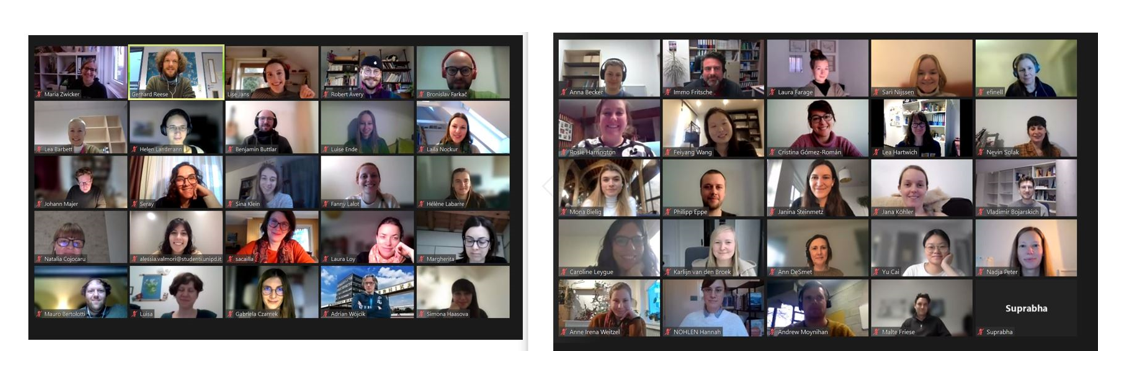RKTS Grant/ Workshop Report by Lise Jans and Gerhard Reese
26.05.2022, by Media Account in grant report
Workshop “A(n EASP) Community of Environmental Social Psychologists”, held Online from 26th January 2022 – 28th January 2022

Lise Jans (University of Groningen, Netherlands) and Gerhard Reese (University of Koblenz-Landau, Germany).
The workshop “A(n EASP) Community of Environmental Social Psychologists” was planned as an hybrid event with 25 participants on-site (sites and rooms in Landau, Germany were already booked) and room for a few online participants. Yet, due to the unexpected strict corona situation in winter, we were forced to conduct it fully online. To foreshadow, this went surprisingly well. The generous funding we received from EASP was primarily used to setup online discussion portals (i.e., gather town) and a research assistant, Suprabha, who strongly supported us throughout the conference.
The workshop set out to establish an international network of environmental social psychologists to pool the competences necessary to address the justice- and group-related ramifications of climate change. In Europe, the most vulnerable regions are generally located in the south and east of Europe (Spain, Italy, Greece, Bulgaria, Cyprus, Malta and Hungary, as well as most of Romania and southern parts of France). At the same time, these regions and groups tend to be understudied, and the majority of published researchers studying this topic, come from privileged backgrounds (Tam & Milfont, 2020). Consequently, we sought to
- Establish an International Community of Environmental Social Psychologists within EASP
- Include the width of social psychologists interested in environmental issues and climate change, and increase understanding in specific challenges diverse groups and regions are facing.
- to reach and train EASP members from regions where access to scientific information, facilities and/or funding is scarce compared to European standards.
Overall, around 70 applicants showed interest in the workshop. Due to the now fully online format, we were able to offer all interested participants a chance to partake. As such, the virtual setting allowed a broader and more diverse set of participants, which was one of the goals we had (see complete list of participants in the appendix). Our participants came from from 23 different countries and 5 different continents. Furthermore, we had professors (including the keynote speakers, see below), post-doctoral researchers, early-, mid-, and late-stage doctoral students among the participants.
Given the online setting of the workshop, we tried to be sensitive to the increased screen time and potential of fatigue. We set out in the late afternoon of day one with a warm welcome and the first Keynote talk by Immo Fritsche, who spoke about the social aspects of our responses to environmental crises, and the Social Identity Model of Pro-Environmental Action. After an extended break, we met in “Gather Town”, an online site that allowed easy and relaxed discussions and helped participants to get to know each other.
The second day started with a keynote talk by Winnifred Louis who talked and discussed about effective and ineffective activism in Oceania. Gabriela Czarnek (Climate change beliefs: The effects of ideology and education are moderated by within-country changes in economic situation) and Eerika Finell (Physical environment, conjunct identification, and mental health) were two selected speakers among the applicants who subsequently presented and discussed their work. In the afternoon, we opened a virtual poster session, which, as it were, was a “video pitch session”: Interested participants (altogether 33) submitted short, max. 5-min video pitches of their work that could be viewed before the session. Participants were then assigned to topical sessions using breakout rooms, in order to discuss the pitches. A format much appreciated by all participants. The afternoon continued with organizer Lise Jans’ talk on small-scale actions that can be a catalyzer of large-scale sustainable change, and ended with a small-group brainstorm about the development of the planned community.
On the third day, Taciano Milfont, our third keynote speaker, spoke about how we as (social) psychologists could avoid “culture-blindness” in environmental social psychology. We then had three additional presenters selected from the participants. Laura Farage (Environmental behavior and the role of norms in West Africa), Adrian Wojcik (The religious sources of pro-environmental attitudes – cross-cultural test of Lynn White hypothesis) and Nevin Solak “Don’t Ruin the Balance of Nature”: Positive Awe and Threat-based Awe About Nature and Support for Pro-environmental Policies During the Pandemic) presented their current work to the still highly attentive audience. After a longer lunch break, organizer Gerhard Reese presented his perspective on the systemic and psychological barriers to climate action. The workshop ended with a wrap-up and specific ideas for setting up and institutionalizing the community. In fact, at the time of writing this report, some steps have been implemented: Our community has a slack channel and a talk series (with a first talk provided early May).
Overall, this meeting was both fun and inspiring. We believe that we managed to spark huge interest in bringing researchers on the crossing between social and environmental psychology together more formally. With the first steps taken to establish a working international community, we are currently discussing plans for the next meeting (on-site and/or satellite meeting with two sites and combined hybrid format).